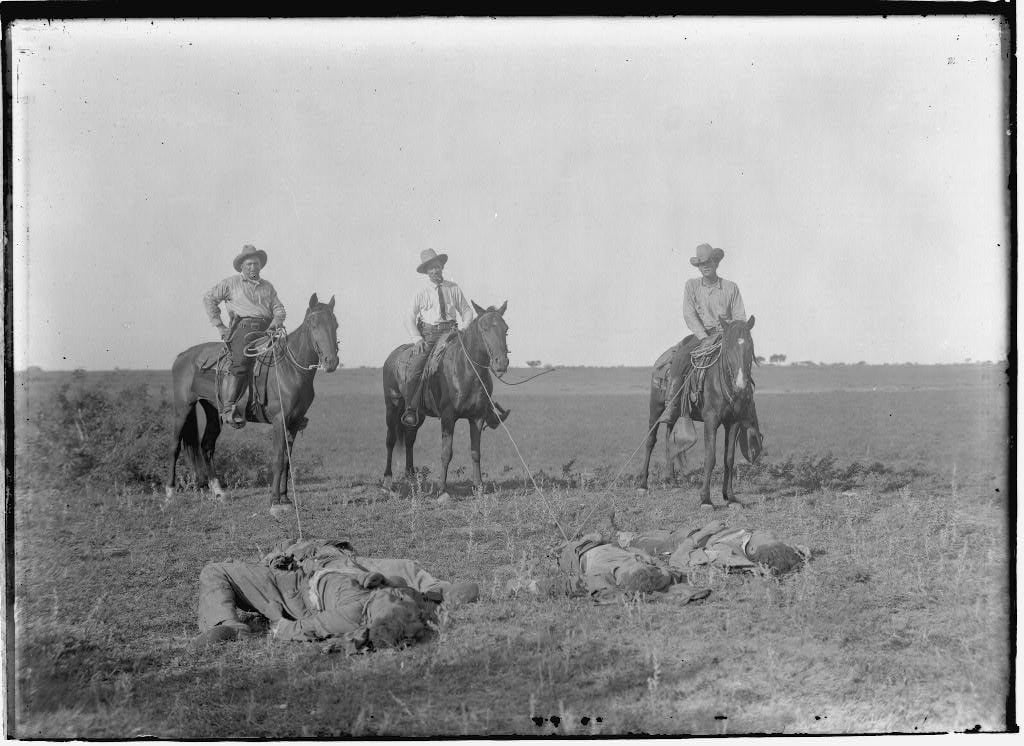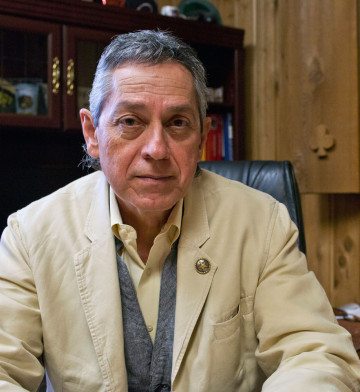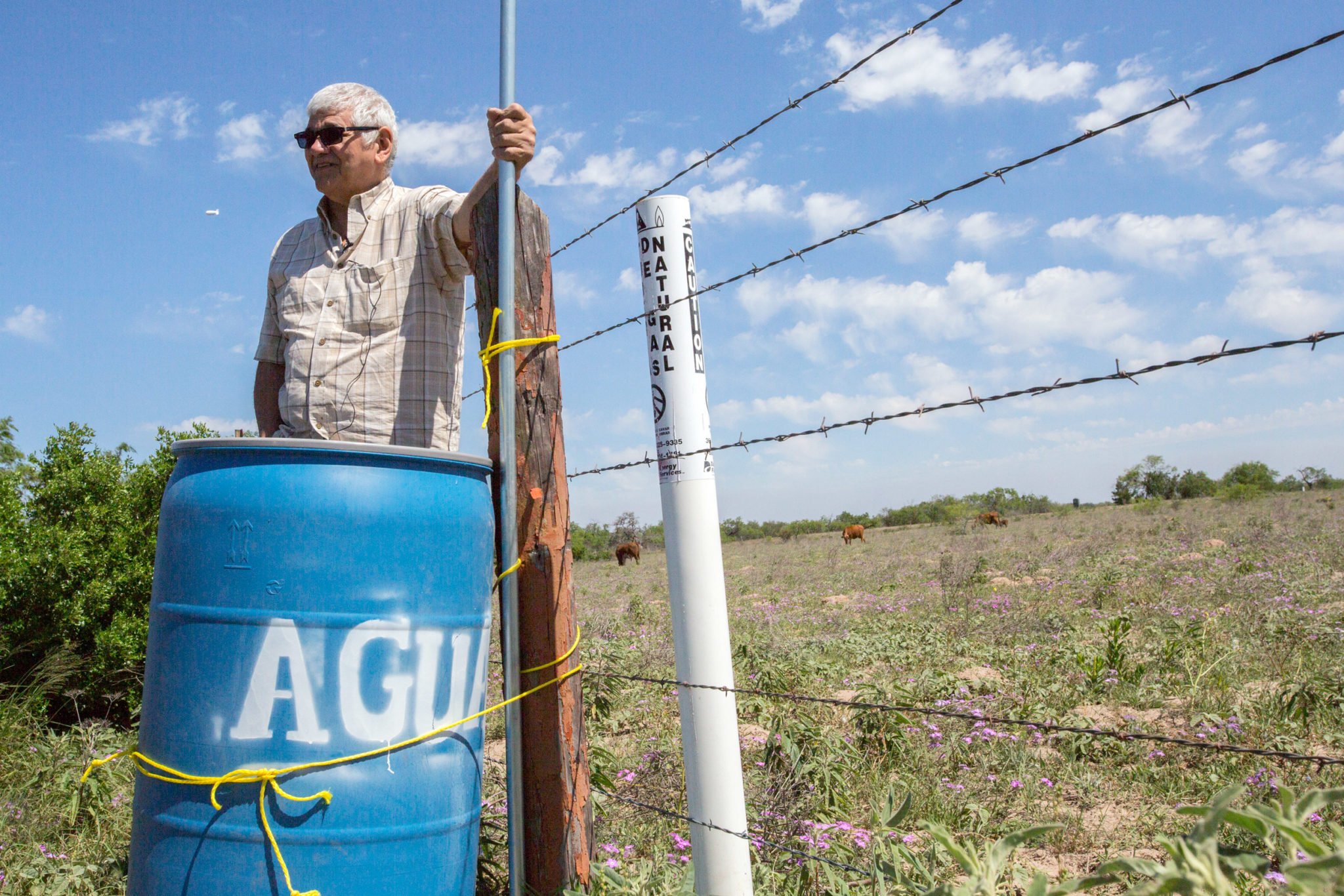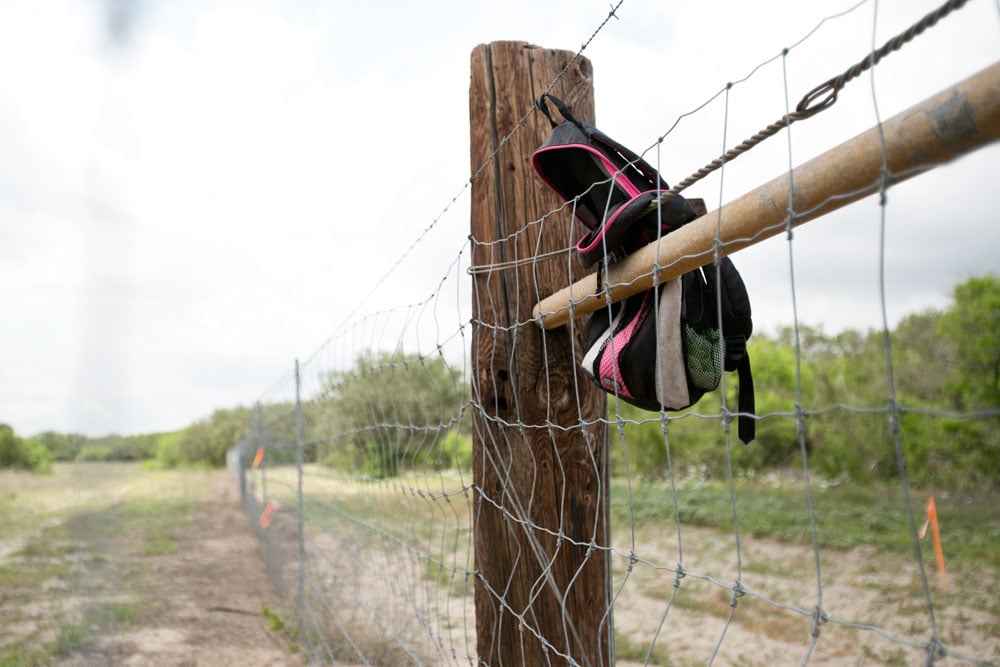
‘Hunting Humans’ Brings the Fringe to the Center

Above: Texas Rangers pose on a South Texas ranch in 1915 after one of their notorious "bandit raids."
The far ends of our colorful political spectrum rarely cause me much worry. I trust the armed militias reportedly roaming the U.S.-Mexico border and the convoy of flag-waving protesters from Murrieta, California that traveled to the Rio Grande Valley will keep their rightful place on the fringe of our political conversation. It’s the center that I watch closely. That’s the contentious territory where ideas and notions from dark chapters in Texas history often reappear, redefining our sense of normalcy and decency.
The migration of extreme notions into the mainstream was recently laid bare in a Newsweek cover story that described ranchers who are “hunting humans” as simply “dealing first-hand with the problems caused by the influx of undocumented immigrants.” The piece, “Hunting Humans: The Americans Taking Immigration Into Their Own Hands” was reported from Brooks County some 70 miles north of the border in South Texas, and quotes three ranchers—Michael and Linda Vickers and another who went only by “B.J.” Not apparently comfortable enough to use her full name, B.J. refers to migrants as if they were prey.
“It’s a cat-and-mouse game,” says B.J. with a grin, driving through ranch trails. Her Heckler & Koch P2000 pistol rests in the cup holder next to her right knee. She starts by looking for footprints—they are most noticeable on the sand tracks she has set up next to the trails that she smooths by dragging tires. When she sees a fresh set, she speeds through the trails, finds the migrants, chases after them until they tire out, corners them and then yells, “Pa’bajo!”—Spanish for down.
The press becomes complicit in ushering extreme ideas into the center when “hunting humans” is treated as acceptable behavior
That humanitarian provision, later described in the Newsweek article, is nonetheless part of an attitude that equates people with animals: “In any case, says Vickers, the windmills provide a water source which is safe for cattle, and therefore for migrants.”
Last year, U.S. News and World Report described Vickers’ group as “simply back-up for U.S. Border Patrol. The goal of the volunteers is not to engage with the ‘criminal trespassers,’ as they call them, but alert border patrol of their findings.” One year later, the ranchers are described as hunting migrants while laying out traps and chasing them down. Maybe these ranchers viewed the migrants not simply as trespassers but as prey all along and now they feel free to express such opinions. It’s difficult to know. But reporters who had interviewed the Vickers before told me they were alarmed at what they described as a sharp shift in rhetoric.
The press becomes complicit in ushering extreme ideas into the center when “hunting humans” is treated as acceptable behavior and counterbalanced with images of ranchers installing life-saving water barrels for migrants. It is a false balance.
Nearly 90 percent of the population in Brooks County is Latino, with five percent foreign born. Many ranches predate the U.S.-Mexico War. And when I read those quotes I’m reminded of the image of a group of Texas Rangers mounted on horseback, the ends of their rope tied around the ankles of three ‘Mexican bandits’ laying face down on the ground. Prized game. The image, captured near Brooks County a little over a century ago, was sold as a postcard and distributed widely.
Back then, the justification for hunting Mexicans was banditry and rebellion but, as history has shown, then as now, the concept of border security was woven from the dark thread of race. The Vickers were once associated with the Minutemen, the militia group described by former President George W. Bush as “vigilantes.” The Southern Poverty Law Center lists the Minutemen and the Vickers’ ‘border volunteer’ outfit as a nativist extremist group.
From the media to the political arena the racially tinged side of “security” and normalized violence has found its way into the center. On July 5, just over two weeks before the Newsweek story was published, Bud Kennedy at the Fort Worth Star-Telegram reported that a Facebook page created for GOP convention delegates included statements such as:“Americans are not breeding while ‘the bronze master races is’… We will die out and they will win.” Kennedy told me some readers complained that he had overstated the importance of Facebook comments. But the page belonged to a faction of the Texas Republican Party that had been instrumental in shaping the state GOP platform. “What I’m concerned about is a Republican Party that has become infiltrated by John Birchers and white nationalists,” he said.

Gov. Rick Perry cruises the Rio Grande with Sean Hannity, posing together on gunboats. The Dallas Morning News reported U.S. Rep Sam Johnson (R-TX) provoked laughter at a groundbreaking event for defense contractor Raytheon Co. when he said: “I don’t know how people cross that river. Maybe Raytheon can figure out a new silent gun.” He then cocked his finger like a pistol. Johnson later apologized.
Lost in the headline-grabbing displays of “border security” is a discussion of whether the border enforcers are in fact breaking the law. I reached Brooks County Deputy Chief Urbino “Benny” Martinez by telephone and read him a Newsweek tweet about the story: For a few ranchers, setting traps for migrants, chasing after them and being intimidating is a hobby.
“That shouldn’t happen, I’ll make that very clear to you right now. That’s the first time I’ve heard that,” he said, distressed. Martinez added that he intended to investigate what is happening on the ranches. “This is not a show, this is not a reality show, this is for real.”
Martinez’s reaction should offer some relief for it shows that, at least for some leaders, border security radicalism has yet to overwhelm our good sense and humanity.
To support journalism like this, donate to the Texas Observer.
